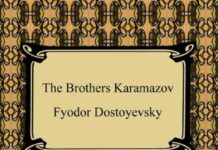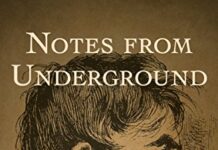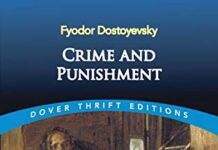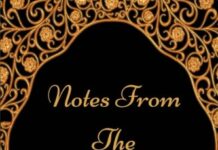
Ebook Info
- Published: 2022
- Number of pages: 713 pages
- Format: EPUB
- File Size: 1.38 MB
- Authors: Fyodor Dostoyevsky
Description
Through the story of the brilliant but conflicted young Raskolnikov and the murder he commits, Fyodor Dostoyevsky explores the theme of redemption through suffering. “Crime and Punishment” put Dostoyevsky at the forefront of Russian writers when it appeared in 1866 and is now one of the most famous and influential novels in world literature.The poverty-stricken Raskolnikov, a talented student, devises a theory about extraordinary men being above the law, since in their brilliance they think “new thoughts” and so contribute to society. He then sets out to prove his theory by murdering a vile, cynical old pawnbroker and her sister. The act brings Raskolnikov into contact with his own buried conscience and with two characters — the deeply religious Sonia, who has endured great suffering, and Porfiry, the intelligent and discerning official who is charged with investigating the murder — both of whom compel Raskolnikov to feel the split in his nature. Dostoyevsky provides readers with a suspenseful, penetrating psychological analysis that goes beyond the crime — which in the course of the novel demands drastic punishment — to reveal something about the human condition: The more we intellectualize, the more imprisoned we become.
User’s Reviews
Reviews from Amazon users which were colected at the time this book was published on the website:
⭐Fyodor Dostoyevsky generally seemed to write books set in the quirky period of time sandwiched in between serfdom and the Communist Revolution in Russia somewhere in the late 19th century. It is a point in time which most people living today could not personally attest to or even have much knowledge about yet it seems oddly familiar in many ways to modern society.It is hierarchical with various classes having obvious advantages over the others yet it wasn’t overly strict like a caste system from which one was cemented into a position in society and could not escape. It also had a strong bureaucracy which society seemed to value and hold in somewhat high regard due to an appreciation of the benefits it provides to a society in need of order and discipline while at the same time chafing at the ways in which it stifled creativity and personal freedom.Against that backdrop this book paints a portrait of a young man who commits a robbery and murder which he argues about for a fair portion of the book within his own mind as he lurches back and forth between despising himself and feeling justified in doing it “for the greater good.” There is also a fair amount of characters in this book who push and pull the main character from various directions as he processes what he has done and how he really feels about it and someone much smarter than me has probably analyzed if these characters had any symbolic meaning or not, but they seem like an odd mix.The main character is a university student driven to crime by desperation mixed with intellectually inspired notions of class warfare. He meets a man at a tavern who is an alcoholic and befriends him early in the book only to later meet the mans daughter and develop a relationship with her. The woman is somewhat similar to the main character in that she is badly conflicted as well in that she professes to be a Christian yet makes a living as a prostitute due to her family being so desperately poor. She becomes a sort of moral voice for the main character. The main character’s sister also appears in town and there is a whole subplot about how she is going to marry a wealthy man to help her family while at the same time being pursued/blackmailed by another man who is obsessed with her only to reject them both for an idealistic third man. There is also a detective who joins the cast at some point and suspects the main character of his crime even though he has little real evidence. He thereafter engages in a psychological game with the main character to break him into confessing.The story also has odd similarities to Doctor Zhivago and the Tell tale Heart. Edgar Allen Poe wrote the Tell tale Heart in the 1840’s and FD didn’t write this story until the 1860’s while Doctor Zhivago was written sometime in the early 1950’s but whether any are similar to another intentionally or due to mere coincidence is beyond my knowledge. I am just noting that because I kept thinking about it while I read it and so many of the characters reminded me of characters from there.In any event, the real theme of this book seems to be the conflict between faith and reason. The main character knows things he is doing (or has done) are wrong, but justifies many of them intellectually and politically only to feel conflicted about them. In the end though the book is really about a journey through the process of faith and reason while at the same time offering a commentary of what the author must have perceived as a rise in intellectual and political thoughts and actions at the expense of morality and truth. Perhaps he divined the coming Revolution or maybe the book is not that deep. I really am somewhat uncertain but I know that I enjoyed reading it and each time I read it I end up thinking more deeply about what the author means, what he was thinking and if he was trying to say something I am not yet grasping. All of these to me are good signs that a book is worthy of reading and enjoying.
⭐Never have I had such a love / hate relationship with a novel.To be fair, there wasn’t anything I necessarily hated about Crime and Punishment, rather, there were just so many times I was frustrated with it. In an earlier update I made as I was reading this I compared the book to jazz and as a precursor to novels such as ‘Manhattan Transfer’ and the modern art movement. I still stand by that statement but I feel Dostoyevsky’s novel was more of a fitful start to the ‘modern’ movement and that it would take a much more conscience effort by later writers to really improve this style of novel writing.Of course, Dostoyevsky didn’t set out to write the first ‘modern’ novel, but he was reacting to modern life and the freedoms that come with it. And that’s the odd thing about this book – the freedom that suffocates our characters. True, most everyone in the book is wretchedly poor and thus shackled by poverty or alcoholism or pride or some other wicked vice, but they’re free to decide how to behave in such a setting. Everyone is bothered by regrets; except Sofia (the hooker we never see turn a trick and who has the now over-done ‘heart of gold’ trope) but they’re all regrets that were of their own conscience making. They chose to kill, or be lecherous, or terrible in some other way and they knew it and they all regretted it. There was no one to guide them – everyone in authority was either non existent or corrupt in some way – and so this ‘modern’ world has to be navigated blind.And that’s the problem. All this freedom is stifling. Nobody knows what to do. Nobody knows if they even have free-will. Nobody has an identity – except, of course, Sofia. Raskolnikov kills two people just to feel something, anything, to see what he’s ‘made of’, what his place in society is and when he gets to Siberia he finally feels free because he now knows his place. And he resents it, which is pretty funny and probably this joked is missed because the rest of the book is so damn depressing, but it’s funny that he hates it all but at least he knows what to hate. It’s a wonderful joke Dostoyevsky tells here and makes the rest of the book worth it.So I’m not sure the book could have been written any different, but the claustrophobia of it all, the long soliloquy’s that, while fascinating, really go on and on and on and never really resolve anything – which is why it’s funny when Razumikhin says we’ll talk our way to the truth.The fact Dostoyevsky was able to pull this novel off is a feat and makes the book earn its place as a true masterpiece. I personally don’t think I ever want to revisit it and I’m wary of reading more Dostoyevsky, but I loved that the book challenged me so much and it did have some wonderful moments that are truly unforgettable – the horse beating, the murders, anything concerning Svidrigailov.As a student of human behavior (and I use the term cautiously after reading this book), Crime and Punishment is a must read for its psychology and for its art. I can’t give it 5 stars (so arbitrary, but here we are) because of my own personal tastes, but it is a ‘5 star’ novel in every regard.I loved it and I hated it; which is why it was almost perfect.
⭐It is no doubt the masterpiece worthy of its reputation. It is not as good as The Brothers Karamazov, but that is hardly a fault. I would have given it five stars, except for the occasional anti-Semitic remark. This comes from several characters, and that perspective is never challenged. That is a disappointing blemish in an otherwise great novel.
⭐My son and I challenge each other to read the classics. I was skeptical about this one but I am really glad I finished it. Now we get to talk about the important messages and themes.
⭐A month back when I started reading this intense psychological thriller by the famous Russian writer Fyodor Dostoyevsky (1821-1881) little did I know that this work will recast my notions about crime as well as punishment. As the name suggests, the novel revolves around the very concept of crime and the consequent punishment imparted for it. Without superfluous tracks in typical Dostoyevskian style, it questions a very basic thing- if one kills an epitome of the evil, a vile vermin to save hundreds of innocents, how can it be called a crime and who can decide the befitting punishment for the same?The protagonist Rodion Romanovitch Raskolnikov is a tall and handsome 23 year old former university student who lives in a suffocating cupboard-like rented room in St. Petersberg, Russia. He publishes an article describing his theory on crime along with a hypothesis relating crime and a high fever. Months later, he shockingly finds himself compelled to brutally murder an old pawnbroker who he considers to be a den of iniquity and a venomous insect. Despite poverty, fever and dilemmas, he comes out unscathed and manages to duck everyone. From police to his intellectual best friend, Razhumihin and from his shrewd landlady to his over-analytical doctor, everyone believes him to be innocent. However, it is his own conscience that he relentlessly grapples with. One day at a cheap tavern, his path entwines with that of a bankrupt alcoholic clerk Marmeladov and later with his dignified but consumptive second wife Katrina Ivanovna (she has three children from a previous defunct marriage) and his religious and timid twenty year old daughter Sonia from his late first wife. When Sonia destroys herself in providing for her starving step-siblings, he bows at her feet, much to the shock of everyone.The novel also has other important characters like Svidrigailov, a 50 year old pedophile all set to marry a 15 year old, Luzhin, a devious narcissist and Dounia, the erudite and charming older sister of the protagonist, fighting her own demons. Raskiolnikov, till the end stays clear and unsuspected yet it is his inner voice that constantly bothers him and he ends up taking odd decisions in order to run away from his own crumbling self. His way of perceiving things is complex yet he manages to convince the reader into agreeing with him. Twists and turns keep the reader on the edge and the ending gives a nice closure to this powerful work. This novel also throws much light on the then Russian society and culture.Not just another run-of-the-mill fiction, ‘Crime and Punishment’ requires contemplation on the reader’s part. It takes one inside the frenzied but brilliant mind of Raskolnikov and argues upon the fundamentals such as of crime, what defines it, who can be called a criminal, what the meaning of punishment is, who actually deserves how much of it in any society, in an era and who deserves to rule the masses. This book breaks old moulds of notions and makes one reflect, that too profoundly. It undoubtedly is a timeless classic.PS- I found this translation to be a bit confusing and messed up at many places hence it is better to get another one from the many available ones.-The scene of Katrina Ivanovna’s depressing death later in the story, literally shook me up and made me cry.
⭐I don’t feel qualified to give a Dostoyevsky book a literary review. I may say though, if you are even slightly thinking of buying this, just do it. And you will end up liking his writing so much, you will purchase other books (after this, buy The Brothers Karamazov).Now for the physical copies review, I got it a little battered from the bottom and a bit from side. Nothing much to write home about but just want to let you know. You may even contact the seller and ask if they can pack it even carefully for you which I didn’t do. All in all this Fingerprint Publications version is excellent and consists of 584 pages (original has 671) these pages contain a little smaller font than the original thus fitting the book in less length. But dont worry the font is completely readable.Good day.
⭐Crime and Punishment is set in Russia in the 1800’s. It is written from the perspective of the protagonist Raskolnikov; a young student. Despite its reputation as being hard going, I found it easy to read and impossible to put down.Due to financial hardship and circumstance Raskolnikov commits murder. Russia was economically and politically unstable at the time of writing and one of the greatest arguments in favor of socialism is that, if people were equal would crime be eliminated? Would the reason for acting criminally no longer exist? The novel spreads this message, without focusing politics as a major theme. Drawing upon the writings of Marx and Engels, Russia became Communist in 1917 under Lenin, succeeded by Stalin after Lenin’s death in 1925.As the title suggests the crime – one man murdering another and; punishment – the guilt, paranoia, mental deterioration and then incarceration are the major themes, the content of the entire novel. Other plot-lines such as romance take a significant back seat. Love does indeed suffer as a consequence of the crime, part of the punishment I guess.A tale of love, justice, psychology and suffering; this is a wonderful read, and despite what Willy Mason says, you should read Dostoevsky at your age.
⭐In my experience, all “great” fiction works on more than one level, and continues to compel readers’ attention for many decades after it was written – something I certainly found true of Crime and Punishment.Other reviewers have said how gripping the story of Raskolnikov is. He is a psychopath of a type familiar from a thousand 20th and 21st century thrillers, in print and on screen. I could well believe that Hitchcock read this book and learned from it, because the build-up of tension is Hitchcockian.Nabakov was not a fan of Dostoevsky, thinking him a bit of a bore and an eccentric – and not a particularly accomplished writer. Humbly, I have to disagree. As well as being a brilliant psychological drama, it’s a critique of Russian society and the intellectual climate in the 1860s, just a few years after the emancipation of the serfs, when ideas like nihilism were in the air. If Raskolnikov had ‘lived’ 60 years later, he might have found a focus for his life in Bolshevism. Although that, as we know, might have involved him in mass-murder, or even genocide as one of Stalin’s henchmen, rather than the single murder he commits in Crime and Punishment.
⭐Sometimes in it’s more reflective moments this book lost me but I think these moments were more down to my mindset at the time rather than the book itself.There were periods I read for hours greedily shovelling it in and moments where I was bored stiff.As someone who is just getting back into reading I would say this is hard going, but once I’m on a roll I’ll probably come back to it and see if I can look at it in a new light and give it that final star.
Keywords
Free Download Crime and Punishment in EPUB format
Crime and Punishment EPUB Free Download
Download Crime and Punishment 2022 EPUB Free
Crime and Punishment 2022 EPUB Free Download
Download Crime and Punishment EPUB
Free Download Ebook Crime and Punishment




